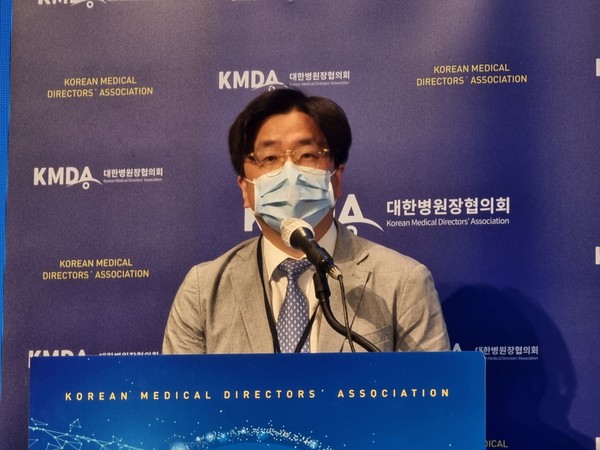Korea seems to be getting out of the long, dark tunnel of Covid-19, but experts point out that the nation should make preemptive preparations for any unexpected situations to minimize damages and overcome them swiftly.
Lee Jae-gap, a professor of infectious disease at Hallym University Gangnam Sacred Heart Hospital, stressed the need for Korea to prepare for the possible resurge of Covid-19 this autumn or winter at a spring seminar held by the Korea Council of Hospital Directors at the Seoul Dragon City on Sunday.

“Come fall and winter, and the nation may face a situation where various respiratory viruses, including Covid-19, influenza, RSV virus, and rhinovirus, are prevalent simultaneously,” Professor Lee said. “Hospitals will have to consider seriously conducting not only Covid-19 virus test other respiratory virus tests when patients visit the respiratory clinic.”
Lee made these and other points in a lecture titled “Suggestions of sustainable small and midsize hospital-type respiratory clinic model.”
He then stressed the need to introduce the “multiplex PCR (polymerase chain reaction) testing method” at respiratory clinics. The infectious disease expert also proposed to introduce the infection prevention management fee for respiratory infectious disease due to the phase-out of face-to-face Covid-19 treatment fees.
Lee cited how to induce as 5-to-11-year olds as possible to receive vaccines as another task.
According to the Korea Disease Control and Prevention Agency (KDCA), as of April 30, the vaccination rate for 12-to-19-year-olds was 75.3 percent for the first shot, 72.7 percent for the second shot, and 21.7 percent for the third shot. On the other hand, the 5-to-11-year-olds’ first shot vaccination rate stood at 1.2 percent of the total 3,067,614 children in that age group.
If Covid-19 resurges in autumn and fall, the number of infections will be far larger in the 5-to-11-year-olds than in other age groups, Lee said.
“The vaccination rate of 12-to-19-year-olds is quite high as they received shots when the Delta wave was raging, but that of 5-to-11-year-olds is worryingly low,” the professor said. “Many children in that age group might not have been vaccinated as they had already been infected with the Omicron variant. However, if other variants appear, the children will be very vulnerable to them.”
Lee also stressed the importance of the second booster shot for adults 60 or older.
“Korea could have reduced the number of deaths if it had provided the fourth shot before the surge of the Omicron wave,” he said. “Vaccine’s effects fall as time goes by, but its effectiveness in preventing infections from getting severe increases. Therefore, health officials should shift the focus of vaccination from preventing infection to reducing the hospitalization and deaths of high-risk groups.”
According to Lee, the problem is it is not easy to predict whether the Omicron’s subvariants will continue to appear, leading to the repetition of small waves or a new variant occurring to replace the Omicron. Therefore, he said, the nation needs to prepare for each scenario.
Based on the World Health Organization predictions, Lee explained that there are three scenarios for Covid-19; “basic case,” in which there are no significant changes in the situation until the pandemic becomes an endemic; “best case,” in which Covid-19 is reduced to a cold; and the “worst case,” in which a new variant appears to result in many critical cases and deaths.
“After August or September, the world will likely face one of these three situations, but even experts find it difficult to predict,” Lee said. “As I see it, the ‘basic case’ is most likely, and the ‘best case’ is least likely.”
Lee also expressed concerns over the government’s sudden changes in quarantine policy leading to greater damages if the pandemic resurges, asking for discretion in maintaining hospital beds for infectious diseases and changing the reimbursement system of treatment costs.
For example, the experts proposed introducing a system in which respiratory clinics also run the long covid clinics.

